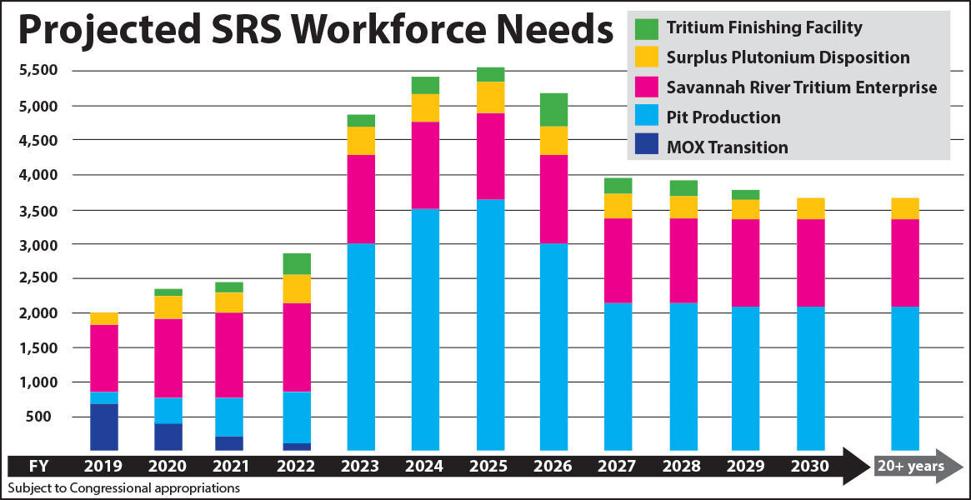ALEXANDRIA, Va. — Thousands of people will be needed for near- and long-term nuclear security missions at the Savannah River Site south of Aiken, which translates to a great deal of jobs in the foreseeable future.
The related hiring effort begins soon, if not now, according to a presentation made Wednesday by Savannah River Nuclear Solutions President and CEO Stuart MacVean. It will likely peak around fiscal year 2025, when roughly 5,500 people will be needed for plutonium pit production preparations, tritium ventures and the in-the-works Surplus Plutonium Disposition project – individual pieces of the overall Savannah River Site pie.
Similar staffing levels are predicted for fiscal years 2024 and 2026, according to a chart MacVean showed during his speech. Things could level out, to just shy of 4,000 people, around fiscal year 2028.
The site already employs thousands and is a momentous economic driver in the two-state region.

Savannah River Nuclear Solutions President and CEO Stuart MacVean, pictured here speaking at a Citizens for Nuclear Technology Awareness forum.
"It's a really exciting time at Savannah River," MacVean said at the 2020 Nuclear Deterrence Summit, stressing how much is actually underway at the sprawling nuclear reserve neighboring New Ellenton. "There's just a lot of activity going on at Savannah River."
A majority of hires made by Savannah River Nuclear Solutions, the top contractor at the Savannah River Site, are local. Nearby schools and colleges have aligned courses and classes with what is done, and what is to come, at the site.
Aiken Technical College lists nuclear fundamentals and radiation protection programs on its website, and last year, thousands of pounds of unneeded stainless steel from the site were donated to local welding curriculums at the Aiken County Career Center, South Aiken High School, Wagener-Salley High School and Grovetown High School, among others.
Earlier this year, SRNS signed memorandums of understanding with South Carolina State and Claflin universities, partnerships with historically black colleges and universities that could advance academic achievement and diversify the nuclear workforce.
"As we work to fill our pipeline," MacVean said at the time, "we're seeking candidates who have qualifications that meet our education and training requirements in any one of several occupations."
South Carolina State University is home to the Palmetto State's only undergraduate nuclear engineering program.
The projected job growth at the Savannah River Site dovetails with project deadlines and schedules that, while they may seem distant and flexible, are ever-closer and, in some cases, are actually recognized as aggressive.
By 2030, the Savannah River Site must produce 50 plutonium pits – nuclear weapons cores – every year, according to a 2018 proposal from the National Nuclear Security Administration and the U.S. Department of Defense. The U.S. hasn't had a large-scale pit production capability for years, and the recommendation made suggests repurposing the failed, multibillion-dollar Mixed Oxide Fuel Fabrication Facility.
Plutonium pit production in South Carolina, MacVean said, will require a very specific group with a very specific skill set.
The Surplus Plutonium Disposition project – more commonly known as dilute-and-dispose, meant to process and disposition metric tons of deemed-surplus defense plutonium in the U.S. – begins operations in earnest in about eight years, according to an NNSA roadmap. The actual path there involves intricate design work and the installation of specialty equipment.
"So right now, our design labs and our production sites, it goes without saying, they're pretty busy," National Nuclear Security Administration Deputy Administrator for Defense Programs Charles Verdon said Wednesday morning. "They're probably going to be a little busier going forward for awhile."





